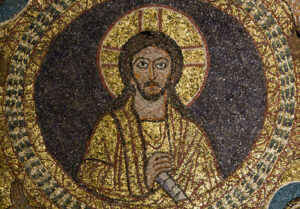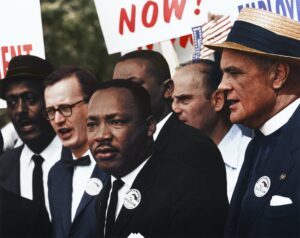While this image does represent a significant demographic of white evangelical Christianity, it does not tell the whole story. White evangelical Christianity is also common in sprawling suburbs of cities that have grown quickly over the last few decades. These suburban landscapes are not just backdrops. They are built environments which pattern, everyday life, form social patterns and shape how communities move and encounter one another. If you want white suburban evangelicals to embrace a more progressive and justice-seeking faith, you must first understand (in order to counteract) the material context of everyday suburban life, a context that intersects with the politics of race and white identity.
White Evangelicalism Grows Up in the Sun Belt
Beginning in the 1960s, the Southern and Western regions of the US experienced rapid economic expansion. This expansion drove waves of migration in the following decades into what came to be known as the Sun Belt region. This region includes cities as far southeast as Miami, extending west through Atlanta, Birmingham, and Nashville, and on to all the major cities in Texas. Continuing further west, the Sun Belt includes Albuquerque, Phoenix, Las Vegas, Los Angeles, and San Diego. Of the top ten most populous city areas in the US, seven are now city areas in the Sun Belt.
As Darren Dochuk documents, evangelical theologies migrated with the people of the Sun Belt. Some of Billy Graham’s most powerful evangelism crusades were held in southern California. Southern Baptist theology flourished across the West, and Pentecostalism continued to spread from its roots in southern California.
Most Sun Belt cities continue to grow, but rather than growing in density, these cities expand ever-outward in sprawling suburban webs. The suburbs of the Sun Belt are often nearly cities themselves in terms of formal designation, population, and land size. However, they usually lack common features of traditional cities, like denser and walkable areas, mixed-use zoning (where commercial and residential activity overlap), and a sense of local history and identity. Instead, they are incorporated affiliates of whatever core metro center they have expanded from.
These are the places where white evangelical Christianity is thriving. Not only has it staved off decline, it is continuing to grow in specific geospatial patterns. It is in these places that non-denominational Christianity and megachurch evangelicalism has made a home for itself (something broad religious demographic surveys often fail to capture).
Church Growth in Alienated Suburbia
The Church Growth movement arose around the same time as the large migrations and expansion of the Sun Belt. Its initial thought-leaders included the likes of Donald McGavran and C. Peter Wagner. Making its way on to the American scene in the 1970s, the movement exploded in the 1990s guided by skilled pastors like Bill Hybels and Rick Warren. The movement has long received criticism for its unabashed use of consumer analysis and marketing strategy, and for its focus on numerical growth in attendance and outreach. It has also attracted the ire of liberal, mainline Protestants for its individualistic approach to church, for eliminating most liturgy, and for avoiding disclosure of denominational affiliation. “Non-denominationalism” is largely Church Growth evangelicalism that has obscured its theological and financial ties for the sake of evangelistic outreach.
Churches that seem to lack a sense of particularity, history and rooted tradition do quite well in suburbs that mirror this same lack of rootedness. Churches that engage people as individual consumers succeed in highly individuated and spatially fragmented suburbs, where most public encounters outside of work happen in commodified places of consumption.
What does it look like to meaningfully live out the gospel in the land of masterplan suburban neighborhoods and strip malls? Ashley Hales grapples with this question in a recent article and book Finding Holy in the Suburbs. Hales remains hopeful about shifting suburban demographics and needs, which she views as opportunities for the work of the gospel. As an expression of this hopefulness, she writes that “suburban geography is uniquely suited to put us into relation with each other.” While her optimism and pragmatic suggestions for suburbanites are commendable, the very nature of how suburbs are constructed challenges this notion.
Suburbs, especially the kinds that arose in Sun Belt cities, are more often places of alienation than connection. They are spatially fragmented through single-use zoning, abound in low-density, single-family housing, require travel by car due to sprawl, and have limited spaces for public gathering. The places where one can briefly encounter people outside of their established networks are places of consumption, such as grocery stores, shopping centers, restaurants, and movie theaters.
The approach of non-denominational evangelical churches born from the Church Growth movement mirrors and helps interpret their material suburban contexts. It is alienated church for alienated congregants, and it resonates. Church provides meaning and purpose within a context of generalized alienation. Recall that the most popular book to ever emerge from the Church Growth movement was Rick Warren’s The Purpose Driven Life, which to date has sold tens of millions of copies. Its popularity spread from evangelicals in Sun Belt suburbs, who found hope in Warren’s theological outline for a purposeful life that fit their suburban context.
Counteracting Everyday Alienation in Suburbia
By measure of participation, some of the most devout and engaged Christians are members of evangelical Church Growth movement churches. They are often at their church two to three times a week, meet regularly in people’s homes, volunteer in multiple ministries, and have daily spiritual practices. Charges of “consumer Christianity,” when directed at these suburban evangelicals, are over-simplified moralistic condemnations. Such condemnations fail to account for the economic and social conditions that shape how people encounter and define the gospel. Indeed, it is always tempting to blame individual people as consumers for their desires and choices, while neglecting how capitalism produces unjust and alienating conditions that shape life on a collective and systemic level — even church and religious life.
Rather than lambast individuals for treating church like something to consume, we must ask: What creates the conditions where this type of church resonates and meets a spiritual need? How do we effectively engage and counter those conditions? How might we create viable spaces for different modes of gathering and for a public, anti-capitalist, justice-seeking gospel to emerge?
White evangelical Christianity is not a monolith. It is more geographically diverse than broad maps and political pundits like to convey in their analysis of religious trends. We must be attentive and specific in our analysis of white evangelicalism if we desire its theological and political transformation. In suburbs where non-denominational Church Growth evangelicalism is the norm, the work of radically progressive, justice-seeking Christianity requires counteracting the alienation of everyday life that fragmented suburban environments produce.
Katie Kay is a seminarian and an emerging leader in the exvangelical movement, where she is working to co-imagine and co-create new, radical forms of progressive evangelicalism.
___
Did you appreciate this article? Please consider making a donation to help us continue to build a new voice for the Christian Left. Click here to donate today.



